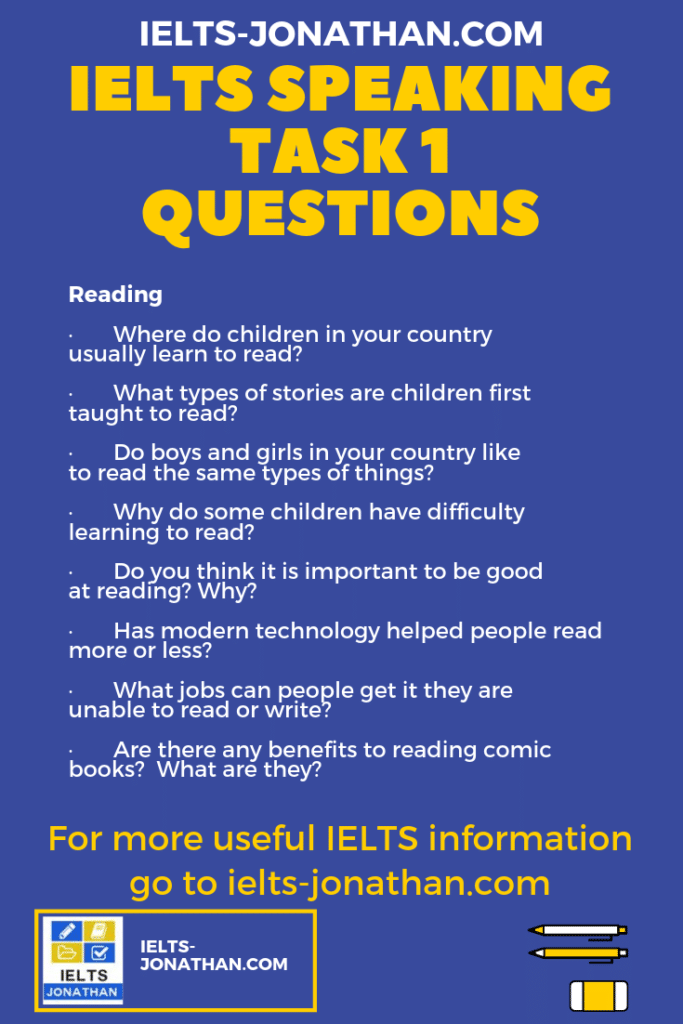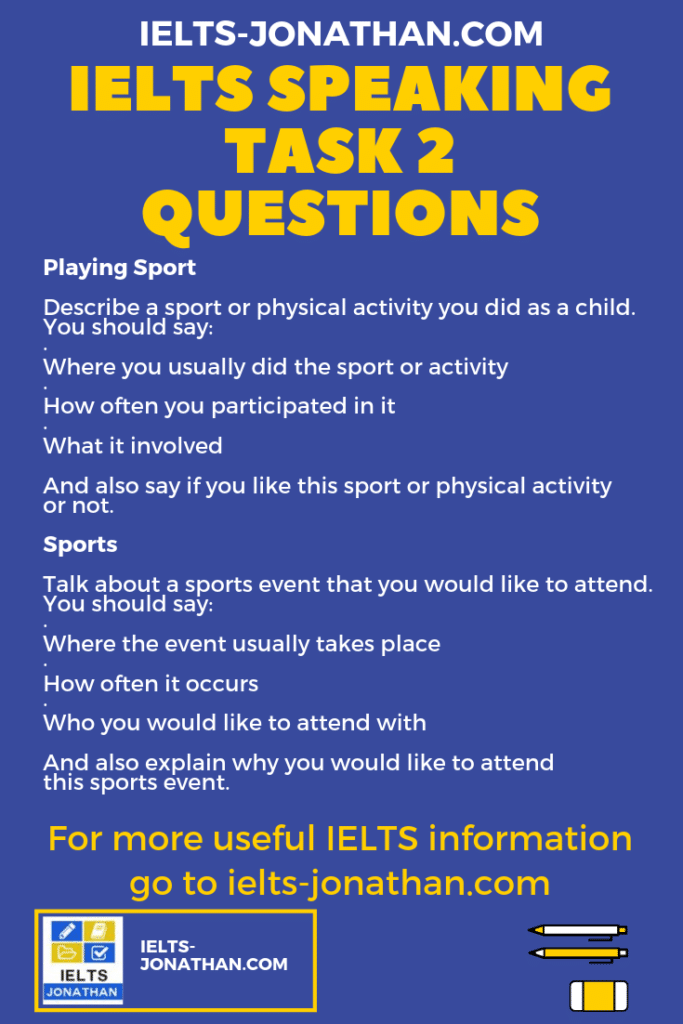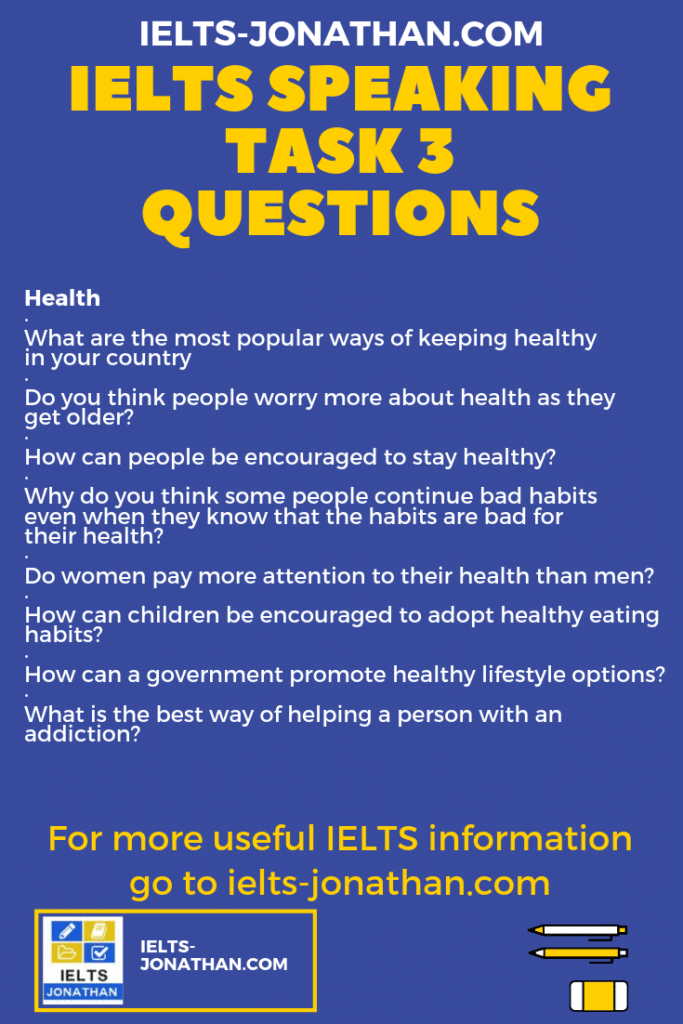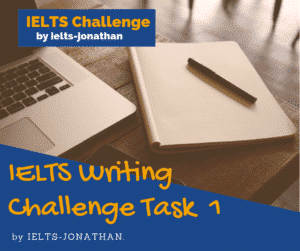The IELTS Speaking test?
The purpose of the speaking test is to allow the examiner plenty of opportunity to access examples of your speech.
In many senses, it’s not a test to demonstrate you know something, i.e, you know what the past simple is, but an assessment to demonstrate you can do something both well and effectively.
In other words, it’s an assessment of YOUR PERFORMANCE.
For that reason, the examiner is gauging the language they hear to make an accurate assessment of your speaking ability.
While there are four criteria that the examiner uses to gauge your language, there is no right nor wrong answer in what you say.
The only WRONG answer you could give is no answer at all!
Speaking Part 1
In Speaking Part 1, there are always three topics that the examiners attempt to ask you within a fixed time period.
The first topic can be either related to house/home/accommodation or your job/vocation or your studies. So you can easily prepare some thoughts around this.
The second and third topics are more varied and selected from a list available to the examiner.
These questions can range from questions about fruit and vegetables to using a computer to reading books and magazines or talking about flowers!
Now you might not feel comfortable about talking about flowers or question the importance of talking about fruit or vegetables if you’re a strict carnivore but don’t worry!
What appear to be questions are in fact ‘prompts’ to stimulate some limited discussion from the simple to the more complex.
They also prepare the way for the more challenging Part 2 and the choices the examiner will make in Part 3.
Look at my example.
Do you read newspapers?
Why?
Talk about a habit/say why you do this.
Do young people or older people read newspapers more?
Why?
Compare two habits/ justify why one is true and the other not.
Will people continue to read newspapers or magazines in the future?
Why?
Talk about newspapers/magazines in the future/ speculate whether people will still read them (newspapers)/ and justify your opinion
Examiner prompts
As you can see, the ‘prompts above’ become more complex.
They additionally allow the examiner to consider different grammatical items, vocabulary or specific functions in English. There is no specific pattern.
Some candidates feel that simply showing you understand the question is enough and I would not be lying if I said this was done by mostly ‘native speakers’!
BUT in the real world and in practice, we rarely reply with a simple ‘yes’ or ‘no’ without some sort of explanation or continuation with the topic so there is no marking criteria for ‘candidate understands the question’
HINT: Don’t let the examiner ask ‘Why/Why not?’
It’s important to provide a sufficient answer so the examiner doesn’t need to ask for further information to check your performance.
Example:
Q – Do you read newspapers or magazines?
A – Yes, I try to read a newspaper at least at the weekend or when I have time because it can be a relaxing thing to do.
A – No, not really. I don’t get the time, and I don’t have much interest in the news, although I know it’s important. I get most of my news from Sky or CNN.
What can native and non-native speakers do to ensure they give a sufficient answer?
The first thing NOT to do is learn memorised answers.
Not only is it usually obvious when an answer is memorised but you are likely to be off topic.
Besides that, the examiner wants to see that you can ‘discuss a variety of topics’ (Band 7 in the Speaking Descriptors) and not produce a monologue.
So why waste your time memorising lines that are unlikely to be useful.
Using linkers will improve your score for fluency and coherence.
When practicing topics for this part force yourself to use conjunctions like ‘because….’ or ‘so…’.
This will encourage you not to give short answers, producing more evidence for the examiner and demonstrating your ability to speak at length
Example:
– Yes, I try to read a newspaper at least at the weekend or when I have time because it can be a relaxing thing to do.
–No, I don’t read newspapers often because I don’t get the opportunity but I like to read online because it’s much more convenient.
This will help you get a good score for fluency and coherence and show the examiner that you can easily ‘speak at length without noticeable effort’(Band 7 in the Speaking Descriptors).
How can I prepare for the topics?
So, I can’t guarantee which topics you will be asked because that is at the examiner’s discretion. However, that doesn’t mean you can’t prepare.
However, I can tell you will be asked about either your job/work/education/studies or about where you live.
So it’s important you are using the right vocabulary and that you’ve practiced this part with a teacher or at least a reasonably good speaker who can check your pronunciation.
Speaking Task 1 Summary
1: The only WRONG answer you could give is no answer at all!
2: You will be asked about job/work/education/studies or about where you live.
3: Don’t let the examiner ask ‘Why/Why not?’
4: This not a test, but a performance assessment.
If you do badly here, continue as you can easily improve your score in Part 2 or Part 3.
Speaking Cue Cards Practice Task 1
Speaking Part 2
How long and what do I have to say
Part 2 is 1 minute’s preparation time and 2 minutes talking time about a topic.
You are given a card with some prompts to suggest what to prepare.
As the talk you give is a monologue, the examiner has an opportunity to listen carefully for the other criteria such as lexical resource and range.
It’s important to plan at least something in the 1 minute preparation.
Why?
Well, firstly it can remind you of what you have already said and secondly it can prompt you to say more if you still have time remaining.
What can I talk about?
The examiner will have already decided what you will talk about before you started the test.
Broadly speaking, the topics can be categorised as such:
An Activity –
e.g. a hobby, a cafe you like going to, a pop group you like, a newspaper you often read, what you like to do when it’s raining.
An Experience –
a party you attended, a meal you enjoyed, a sports event/concert you went to, a time when you won a prize/medal, a speech you gave, a holiday/difficult journey, a film you saw, a book you read, a day out.
An Imaginary situation –
e.g. a job you’d like to have, a something you’d like to buy, a language/skill you’d like to learn, a country you’d like to visit, an invention you’d make, a business you’d like to start.
An Object –
e.g. something you bought or returned to the shop, something you’re planning to buy, an object you value, a piece of technology you use, a gift you gave or received, a photo/painting you like.
A Person –
e.g. a teacher you like, a polite person you know, a neighbour, someone you remember from your childhood, a person you admire, a celebrity, someone you met recently.
A Place –
e.g. a museum, a sports venue, a park, a tourist attraction, a building you like, a restaurant/cafe/shop you often go to, a city or town.
Three things to avoid doing in IELTS Speaking Part 2:
1 – Not having enough to say – Not having enough to say can affect your band score (Band 7 speaking descriptors).
It’s important to use the 1 minute preparation time to make some notes.
You generally get 3 to 4 prompts including the title so you can easily use this to plan what to talk about within the 2 minutes you have to speak.
As a rule the two minutes can be divided into 4 parts so imagine 30 second segments.
At the end of the two minutes the examiner will stop you, probably mid-sentence.
That’s good news!
If you don’t finish all you wanted to say, it doesn’t matter because you managed to speak for the required time.
2 – Repetition – Unlike the Writing Test, going off-topic is not assessed.
Your priority is to keep talking for the full 2 minutes, but repetition can affect your band score.
Use your preparation notes as a checklist and if the examiner has not asked you to stop, develop the discussion further even if you go off-topic, like this!
Topic – Using a website
Using a website – using a computer programme – using a laptop – using my phone – using an app
I’d like to talk about a website I use often. So, the website I use is Google. I think most people use this website, mainly searching for information. Actually, I don’t use websites much apart from Google. I don’t really like the internet either.
I’m a designer, so I do use design programmes such as Adobe and others. I design my images using this programme. It’s very good, and quite expensive to buy. It’s also difficult to learn to use well. When I finish a design I send it to a publisher so that is the only contact I have with a website. I also don’t use the internet to browse for images. I prefer to visit a gallery in person for my inspiration.
I use my laptop mainly for to do with my designs as I don’t have room for a desktop PC and anyway, I am often moving from place to place.
My favourite device is my ipad, it’s got loads of apps I don’t use, I think many apps are a waste of time, a waste of my time too, but I like my ipad because I can work from a coffee shop, or on the train or more or less anywhere.. It’s really portable, and convenient. I think I’m quite attached to it……..
3 – Speaking too quickly – There really is no need to speak too quickly. You are not assessed on how much you say, but on what you are able to say.
Trying to fit too much information into 2 minutes means you run the risk of lowering you pronunciation score by becoming incomprehensible. (Band 7 speaking descriptors)
Speaking too slowly,mumbling and looking at the floor when you are speaking can also have an effect!
Hint 1: Using your preparation time to plan at least four topics for development.
Hint 2: Don’t repeat what you have said, it could affect your fluency.
Hint 3: Don’t speak too quickly, it could affect your pronunciation.
Speaking Cue Cards Practice Task 2
Speaking Part 3
By now the examiner will already have some idea of your band score and will be looking for further confirmation of this.
But it’s not too late. In fact some of the best band scores are often awarded at this point in the test.
In many ways this is where the examiner really gets an opportunity to comment on your performance.
In this more natural discussion, the language you can produce is much more striking and memorable and the examiner will be noting for example any of these Band 7 speaking descriptors.
- speak at length and use a range of linking words
- discuss a variety of topics and use some less common and idiomatic vocabulary
- use a range of complex structures with some flexibility
- use a range of pronunciation features and be easy to understand
What will the discussion be about?
The good news is that Part 3 is an extension of the discussion you gave in Part 2.
So if you talked about a holiday in Part 2,
Part 3 might be about the environmental impacts of tourism in general
or commercial reasons to encourage tourism in certain areas
As you can see, while the questions develop from Part 2, they become more challenging or may change topic direction as the discussion continues.
Here’s another example
A city you like
Living in cities generally
Improving urban Life
Why some people prefer rural areas
The advantages of working in cities and living in the countryside
Another difference is that you are expected to give more comprehensive and complete answers than in Part. You should also support your answers.
So for example
Answer the question – say why – give an example – give an implication
If you do this you are more likely to match the Band 7 speaking descriptors.
- speak at length and use a range of linking words
- discuss a variety of topics and use some less common and idiomatic vocabulary
- use a range of complex structures with some flexibility
- use a range of pronunciation features and be easy to understand
Here’s my example.
Well, a lot of people choose to live in the countryside rather than live and work in the city because I think they want to escape the stress of daily life and the well-known health impacts of pollution in cities, and maybe just forget their worries, you know, their work in the evening or weekend. I think the people that tend to do this live in larger than normal houses or apartments near the main transport systems, probably because they earn more than average. I think if you able to do this then you are fortunate but I think there are implications to consider. A good example is the increased pollution associated with daily commuting.
Hint: 1 The topic will be related to Task 2
Hint: 2 Your opinion is always right; the examiner is simply interested in how well you say something or discuss a topic, i.e your performance.
Hint: 3 Try to support your opinion with evidence when you can.
The examiner may stop you, disagree with your opinion, or challenge an assumption you make.
That’s ok!
They believe that you can up your Band Score and are trying to assist you to do so!
Speaking Cue Cards Practice Task 3
What Next?
Other Speaking Guides
You can practice many of these things at home, but my advice is to keep up-to-date with typical topics that come up in IELTS.
I regularly post these on my Facebook page and also Blog on ielts-jonathan.com.
Make sure that you read the articles, note the vocabulary, and keep a list of key arguments for and against.
This will also help you with your reading, writing and listening.
Finally, you can go over to my Facebook page and join thousands of other students who are working towards the test.
Join my IELTS WRITING TASK 1 group here, for free practice.
Good Luck!
Jonathan
I’m Jonathan I’ve taught IELTS and University English in more than a dozen universities and schools around the world. I’m a parent, traveller and passionate about language teaching and helping students achieve their dreams. Whilst living in Austria or working in Asia, I run IELTS courses to help students get to where they want to be. If you are serious about IELTS, connect with me to see how I can help you.
Share this:
- Click to share on Twitter (Opens in new window)
- Click to share on Facebook (Opens in new window)
- Click to share on Pinterest (Opens in new window)
- Click to share on WhatsApp (Opens in new window)
- Click to share on Telegram (Opens in new window)
- Click to share on Tumblr (Opens in new window)
- Click to share on LinkedIn (Opens in new window)
- Click to print (Opens in new window)






